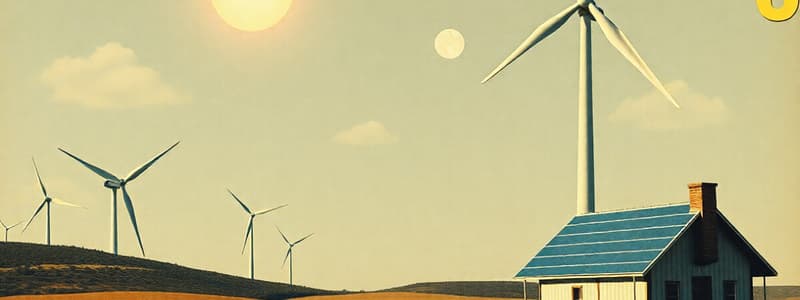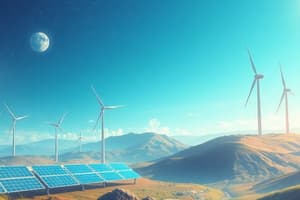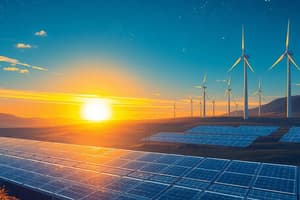Podcast
Questions and Answers
Les sources d'énergie renouvelables sont considérées comme une solution durable car elles sont constamment reconstituées.
Les sources d'énergie renouvelables sont considérées comme une solution durable car elles sont constamment reconstituées.
True (A)
L'énergie solaire est une source d'énergie intermittente car elle dépend des conditions météorologiques.
L'énergie solaire est une source d'énergie intermittente car elle dépend des conditions météorologiques.
True (A)
L'énergie éolienne est une source d'énergie plus fiable que l'énergie solaire car les conditions météorologiques ont moins d'impact sur elle.
L'énergie éolienne est une source d'énergie plus fiable que l'énergie solaire car les conditions météorologiques ont moins d'impact sur elle.
False (B)
L'énergie géothermique est une source d'énergie qui est disponible dans toutes les régions du monde.
L'énergie géothermique est une source d'énergie qui est disponible dans toutes les régions du monde.
Signup and view all the answers
L'énergie hydroélectrique est considérée comme une source d'énergie propre, sans impact environnemental.
L'énergie hydroélectrique est considérée comme une source d'énergie propre, sans impact environnemental.
Signup and view all the answers
L'énergie biomasse est considérée comme une source d'énergie complètement neutre en carbone.
L'énergie biomasse est considérée comme une source d'énergie complètement neutre en carbone.
Signup and view all the answers
L'énergie éolienne est plus coûteuse à exploiter que l'énergie solaire.
L'énergie éolienne est plus coûteuse à exploiter que l'énergie solaire.
Signup and view all the answers
L'énergie des océans est une source d'énergie largement utilisée et mature à l'échelle mondiale.
L'énergie des océans est une source d'énergie largement utilisée et mature à l'échelle mondiale.
Signup and view all the answers
Les sources d'énergie renouvelable ont une production intermittente, ce qui nécessite des solutions de stockage d'énergie.
Les sources d'énergie renouvelable ont une production intermittente, ce qui nécessite des solutions de stockage d'énergie.
Signup and view all the answers
Les coûts d'exploitation des technologies d'énergie renouvelable sont généralement plus élevés que ceux des combustibles fossiles traditionnels.
Les coûts d'exploitation des technologies d'énergie renouvelable sont généralement plus élevés que ceux des combustibles fossiles traditionnels.
Signup and view all the answers
Le développement d'infrastructures n'est pas important pour intégrer les énergies renouvelables dans le réseau.
Le développement d'infrastructures n'est pas important pour intégrer les énergies renouvelables dans le réseau.
Signup and view all the answers
L'augmentation de la sensibilisation du public et du soutien politique est essentielle pour accélérer la transition vers les énergies renouvelables.
L'augmentation de la sensibilisation du public et du soutien politique est essentielle pour accélérer la transition vers les énergies renouvelables.
Signup and view all the answers
Les technologies émergentes comme la conversion thermique océaniques ne sont pas liées à l'avenir des énergies renouvelables.
Les technologies émergentes comme la conversion thermique océaniques ne sont pas liées à l'avenir des énergies renouvelables.
Signup and view all the answers
Flashcards
Intermittence
Intermittence
L'output de certaines énergies renouvelables comme le solaire et l'éolien n'est pas constant.
Infrastructure
Infrastructure
Les installations nécessaires pour intégrer l'énergie renouvelable dans le réseau électrique.
Utilisation des terres
Utilisation des terres
La nécessité d'une grande superficie pour les projets d'énergie renouvelable.
Impact environnemental
Impact environnemental
Signup and view all the flashcards
Coût des renouvelables
Coût des renouvelables
Signup and view all the flashcards
Énergie renouvelable
Énergie renouvelable
Signup and view all the flashcards
Énergie solaire
Énergie solaire
Signup and view all the flashcards
Énergie éolienne
Énergie éolienne
Signup and view all the flashcards
Hydroélectricité
Hydroélectricité
Signup and view all the flashcards
Énergie géothermique
Énergie géothermique
Signup and view all the flashcards
Énergie de biomasse
Énergie de biomasse
Signup and view all the flashcards
Énergie océanique
Énergie océanique
Signup and view all the flashcards
Study Notes
Introduction
- Renewable energy sources are energy sources that are naturally replenished over relatively short periods.
- They are crucial for mitigating climate change and reducing dependence on fossil fuels.
- Key advantages include sustainability, reduced greenhouse gas emissions, and potential for local energy generation.
Types of Renewable Energy
-
Solar Energy:
- Harnessing sunlight through photovoltaic cells (solar panels) or concentrated solar power (CSP).
- Abundant and widely available, but intermittent due to weather conditions.
- High upfront costs but low operating costs.
- Versatile applications in residential, commercial, and utility-scale systems.
- Potential for advancements in efficiency and cost reduction.
-
Wind Energy:
- Capturing wind energy using wind turbines.
- More reliable than solar, but varies based on wind patterns.
- High initial investment but low operating costs.
- Suitable for areas with consistent wind resources.
- Potential to integrate with energy storage solutions.
- Impact on wildlife is a growing concern.
-
Hydropower:
- Generating electricity from the movement of water, utilizing dams and water flow.
- Relatively inexpensive to operate once infrastructure is established.
- Significant upfront costs and environmental impacts concerning ecosystem disruption.
- Dams can create reservoirs and impact river ecosystems.
-
Geothermal Energy:
- Utilizing heat from the Earth's interior for power generation or direct use in heating applications.
- Relatively constant output compared to other renewable sources.
- Limited geographically, primarily in areas with volcanic or geothermal activity.
- Lower emissions compared to fossil fuels.
- Potential for both electricity generation and direct use.
-
Biomass Energy:
- Using organic matter (like wood, agricultural waste, or dedicated energy crops) to generate heat or electricity.
- Carbon neutral if sustainably managed.
- Potential land use and resource conflicts.
-
Ocean Energy:
- Harnessing energy from various ocean phenomena like waves, tides, and ocean currents.
- Potential, but still under development and requires significant research.
- Wave energy is influenced by wave patterns.
- Tidal energy requires suitable coastal geography.
- Ocean currents are less developed and require significant research.
Challenges and Considerations
- Intermittency: Some renewable energy sources (solar and wind) have intermittent output, requiring energy storage solutions or grid management strategies.
- Infrastructure: Developing infrastructure (transmission lines, storage facilities) is important to integrate renewable energy into the grid effectively.
- Land Use: Renewable energy projects can require significant land areas.
- Environmental impacts: Certain renewable energy sources can have environmental impacts (e.g., habitat loss from dams, visual impacts related to wind turbines).
- Cost: Upfront costs for some renewable energy technologies may be higher than traditional fossil fuel options; however, the operational costs are significantly lower.
Future of Renewable Energy
- Continued advancements in technology will increase efficiency and reduce costs.
- Integration of renewable energy with energy storage systems will improve reliability.
- Development of smarter grids will help manage the intermittent nature of renewable energy sources.
- Expanding research and development in emerging technologies (e.g., ocean thermal energy conversion, hydrogen).
- Increased public awareness and policy support is critical to accelerating the transition.
Studying That Suits You
Use AI to generate personalized quizzes and flashcards to suit your learning preferences.
Description
Ce quiz explore les différentes sources d'énergie renouvelable, telles que l'énergie solaire et éolienne. Vous découvrirez leurs avantages, leurs coûts, et leur impact sur l'environnement. Évaluez vos connaissances sur ces formes d'énergie durables essentielles pour un avenir écologique.




